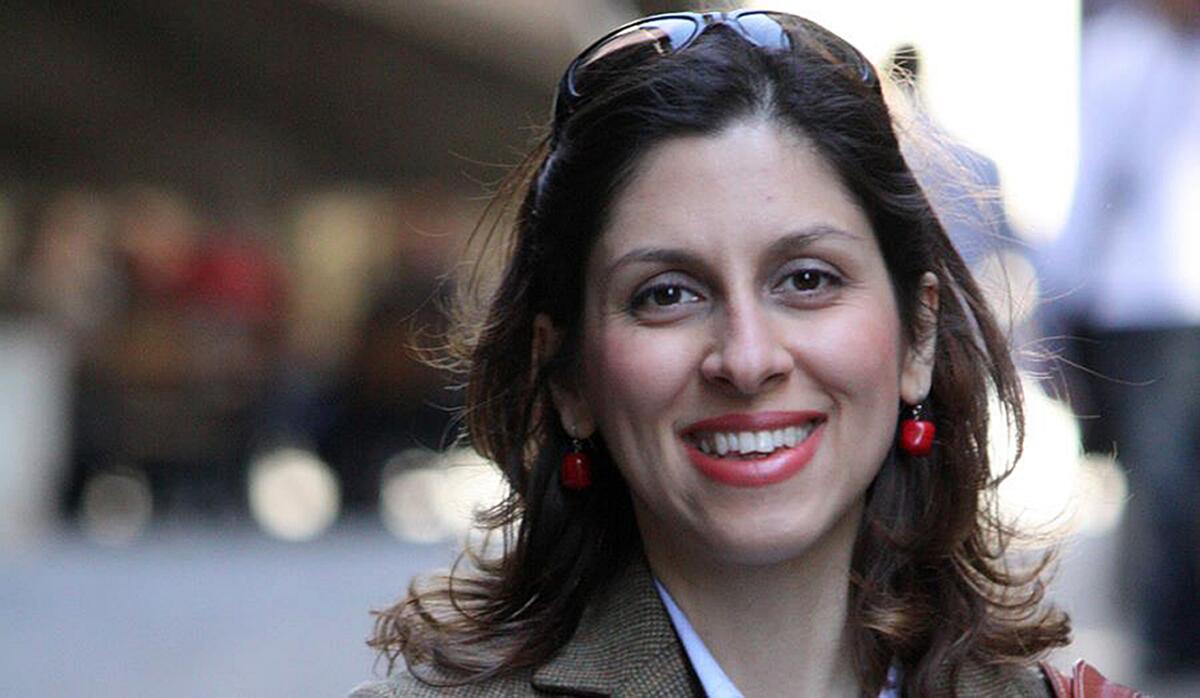Iran frees British woman detained in Iran for nearly 6 years after debt paid

- Share via
LONDON — Two British citizens who had been jailed in Iran for more than five years — a charity worker and a retired civil engineer — were on their way home Wednesday after the U.K. government settled a decades-old debt to Iran.
Nazanin Zaghari-Ratcliffe, 43, and Anoosheh Ashoori, 67, landed in Oman after a two-hour flight from Tehran and were expected to arrive in Britain late Wednesday.
The British government said a third detainee, Morad Tahbaz, who holds U.S., British and Iranian citizenship, was released from prison on furlough as part of the same deal.
The breakthrough was reached as world leaders try to negotiate the return of Iran and the U.S. to an international agreement designed to limit Tehran’s nuclear enrichment program — talks that have been complicated by the prisoner issue. Negotiators have edged closer to a road map for restoring the accord, though recent Russian demands slowed progress.
“Looking forward to a new life,” said Richard Ratcliffe, who has worked for his wife’s release and planned to greet her at a British military base with their 7-year-old daughter, who had already picked out the toys she wants to show her mother.
“You can’t get back the time that’s gone. That’s a fact,” Ratcliffe said. “But we live in the future.”
The release of Zaghari-Ratcliffe and Ashoori comes as the United States, Britain and other countries seek <JU>to secure the release of dozens of dual nationals detained by Iran, which doesn’t recognize their right to hold citizenship in another country.
Family members and human rights activists accuse Iran of arresting the dual nationals on trumped-up charges to use them as bargaining chips to squeeze concessions out of Western nations.
British Foreign Secretary Liz Truss told lawmakers that the change of government in Iran last summer had been instrumental in moving the talks forward. The recently elected president, Ebrahim Raisi, is a hard-line protege of Iran’s supreme leader known for his hostility to the West.
“I was able … to reset the relationship, to be clear that we were serious about resolving the outstanding issues that Iran had, and they were clear they were serious about resolving the outstanding issues we had,” Truss said in the House of Commons.
Wednesday’s announcement came after extensive diplomacy that secured the release of the dual nationals and led to agreement to repay the debt in a way that complies with U.K. and international sanctions. Britain agreed to pay Iran $515.5 million, which will be ring-fenced so the money can be used only for humanitarian purposes. The British government declined to offer details of the arrangement.
While the British government has refused to acknowledge a link between the debt and the detention of the dual nationals, Zaghari-Ratcliffe’s husband has been outspoken in arguing that Iran was holding her hostage to force Britain to pay.
Years later, some former hostages at U.S. Embassy in Tehran say America and Iran have more reason to be allies than enemies. Others are not so sure.
The debt has been a sticking point in British-Iranian relations for more than 40 years.
After the Islamic Revolution in 1979, the U.K. canceled an agreement with the late shah of Iran to sell the country more than 1,500 Chieftain tanks. Since the shah’s government had paid in advance, the new Iranian government demanded repayment for the tanks that were never delivered. The two countries have argued over the debt ever since.
Hope for a deal had been growing since Tuesday, when the member of Parliament who represents Zaghari-Ratcliffe’s neighborhood in London announced that Iranian authorities had returned her passport.
Responding to questions about the talks before the deal was announced, Truss said the U.K. believed the debt was legitimate and the government had been looking for ways to pay it that would comply with international sanctions.
When asked whether Britain would consider paying with goods such as medical equipment, Truss told Sky News she couldn’t comment.
Zaghari-Ratcliffe was taken into custody at Tehran’s airport in April 2016 as she was returning home to Britain after visiting family in Iran. She was employed by the Thomson Reuters Foundation, the charitable arm of the news agency, but she was on vacation at the time of her arrest.
Zaghari-Ratcliffe was sentenced to five years in prison after she was convicted of plotting the overthrow of Iran’s government, a charge that she, her supporters and rights groups deny. She had been under house arrest at her parents’ home in Tehran for the last two years.
Boris Johnson, as foreign minister in 2017, complicated efforts to free Zaghari-Ratcliffe by saying incorrectly that she was training journalists when she was arrested. He later apologized, though Iranian media repeatedly pointed to his remarks.
Antonio Zappulla, CEO of the Thomson Reuters Foundation, said his organization was “overjoyed” that Zaghari-Ratcliffe had been freed.
“No one can begin to imagine what Nazanin has endured throughout the past tortuous six years; denied her freedoms, separated from her husband and young child, battling significant illness, thrown in solitary confinement,” Zappulla said in a statement. “An innocent victim of an international dispute, Nazanin has been one of many used as political pawns. Her treatment has been utterly inhumane.”
More to Read
Sign up for Essential California
The most important California stories and recommendations in your inbox every morning.
You may occasionally receive promotional content from the Los Angeles Times.













